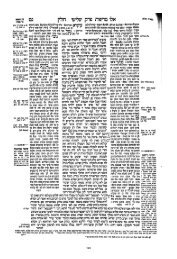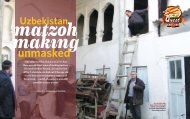Holy Shibuta: A fishy tale for Rosh Hashana - Halachic Adventures
Holy Shibuta: A fishy tale for Rosh Hashana - Halachic Adventures
Holy Shibuta: A fishy tale for Rosh Hashana - Halachic Adventures
You also want an ePaper? Increase the reach of your titles
YUMPU automatically turns print PDFs into web optimized ePapers that Google loves.
purchased the fish, recorded the eventwith many pictures that quicklyclogged my inbox, but alas the fish arestill in Iraq because we have not founda legal means to ship them from thereto Israel.OUR SEARCH was not over and took apositive turn when we “discovered”that the Tigris and Euphrates havetheir sources in a friendly country,Turkey. Quite <strong>for</strong>tuitously, I found notjust a fish expert but a Barbus grypusexpert, Dr. Zafer Dogu, from theDepartment of Fisheries, BozovaVocational School, Harran University.He was more than glad to cooperateand find a few fish <strong>for</strong> us. But thingsimproved even more when we contactedthe Turkish embassy, which graciouslyassisted us with arrangements<strong>for</strong> our trip to study the shibuta in theEuphrates, just a stone’s throw fromHarran, the city of our <strong>for</strong>efatherAbraham.We flew to Istanbul and from there toSanliurfa, landing on the longest runwayin Turkey in a deserted, brand newairport that was opened only the previousweek. One’s initial impressionupon arriving in this area near theEuphrates is that of the lush greenpatches irrigated by the majestic riveramong the otherwise moon-like landscapeof the harsh arid region of southcentralTurkey. We stepped out of theairport into 44º heat and proceeded tothe office of Governor Mehmet Özel,who warmly welcomed us and assistedus with all of our needs.After an initial meeting with the governor,the fish expert and his boss, wewere taken to a lake that was <strong>for</strong>medwhen the Atatürk Dam on theEuphrates was completed in 1993. Thedam, one of the largest in the world, ispart of the massive $32 billion publicproject known as the GreatSoutheastern Anatolia Project (GAP)that has greatly improved the standardof living in the region. The lake covers815 sq. km., and when it was filled <strong>for</strong>the first time it submerged 25 villages,displacing 55,000 inhabitants, and severalimportant unexplored archeologicalsites.Waiting <strong>for</strong> us on the lake were twoboats that took us to the middle of thisplacid body of water, where weobserved local fishermen pulling innets full of fish. Un<strong>for</strong>tunately, none ofthe fish caught while we were therewere shibuta. So as not to disappointus, Dogu, took out and prepared (verycooperatively according to our instructionsso that it remained kosher) one ofthe shibuta he had caught <strong>for</strong> us inadvance, and a lovely lakeside “statedinner” with the governor was held.From there, we were taken to see thefish research facility where work isbeing done on raising, among otherfish, the shibuta by, among others,Dogu who is a leading researcher onBarbus grypus sperm.Perhaps the most interesting aspectof the story came to light when wereached our hotel, an old stone structurebuilt right near an early Arab holysite called the Mosque of Abraham inthe ancient part of Sanliurfa. Accordingto Muslim tradition, King Nimrod wasangered by Abraham having smashedhis father’s idols, and had him catapultedinto a fiery furnace. God in Hisbenevolence miraculously caused thefire to turn into water and the logs intofish. And not just any fish, but shabut.On the site of the furnace-turned-pondan ancient church existed and then amosque was built.In 1896 this pool was visited by aChristian traveler who described theexperience (See http://armenianhouse.org/harris/armenia/letter11.html).“I was visiting, under guard of aTurkish soldier, the most beautiful partof Edessa, the fish-pond on the bordersof which stands the Mosque ofAbraham the friend of God, and aMoslem college. This college is the successorof the famous Christian schoolof Edessa, and the mosque, no doubt,marks the site of an ancient Christianchurch. The pool is full of fish, which itis prohibited under severe penalty tokill, and whichevery one feedswith bread andpennyworths ofparched corn. Sucha rush when youthrow it in! Theytumble over oneanother, and jumphalf out of thewater. Obviouslythe protection andsupport which thefish enjoy comesfrom a time whenthey were consideredsacred. So Iasked my soldierwhat was the nameof the fish, and hisanswer was, ‘InArabic they arecalled shabut.’”THIS WAS NOT theend of the story. Itwas time to take afish to Los Angeles<strong>for</strong> an OU “halachic dinner” to sharewith the rest of the Jewish world (seehttp://www.greenspandental.com/JewishJournal.com.html). But how couldwe get the fish into the US legally andwith it staying fresh? This turned outto not be a concern. We were in<strong>for</strong>medin an e-mail by the deputy chief ofTrade Operations, Customs and BorderProtection of the Port Authority of NewYork and New Jersey that “non livingfish [from Turkey] that are <strong>for</strong> personalconsumption and free from livepests/insects are not regulated and permittedentry.”Dogu’s boss, Asst. Prof. ErdinçSahinöz, confirmed the health status ofour fish. Going through security isoften a tense experience. In the isolated,new empty Sanliurfa airport, thesecurity people sat up straight in theirchairs and their eyes popped whenthey saw a large fish on the X-ray scanner.A lot of explaining and laughingwent on in security offices that day,and we gave a newmeaning to flyingfish. They found itso amusing (andwe were the onlyThe pig, the most detestableof animals to the Jewishpeople, is of course<strong>for</strong>bidden as food. However,should one have a penchantto taste the <strong>for</strong>bidden swine,we are in<strong>for</strong>med that theflavor of pork is identicalto (part of) the shibutaUS army chaplain Lt.-Col. Jeremy Steinberg goes fishing during his tour of duty in Iraq.passengers insight) that theyeven permitted usto photograph theX ray of the shibuta.Had our Turkishbeen better, wemight have founddry ice in Istanbul,but given its currentstate our preciouscargo waswrapped in regularice, hand carriedand stored inthe overhead bins,and off we went.The drippingwater weexplained to fellowpassengersmust be faulty airconditioningunits on the planes, andwe headed to LA hoping <strong>for</strong> the best. Itarrived still frozen, was masterfully preparedby the chef at the Prime Grillwith applesauce, instead of an apple inits mouth, and was willingly consumedat the Baron Herzog winery in Oxnardby a group of OU rabbis.The question we are often asked is“does it taste like pig?” Having nevertasted pork, we cannot personallyanswer that question. But the final verdictof the chef at the Prime Grill, afterfinding commonality between their texturesand consistency, was a definite“no.”What is interesting is that three differenttexts exist regarding the exactdescription of the shibuta’s taste. Onesource says the fish tastes like pig.Another says its brain does, and a thirdstates the tongue is the tasty morsel.Could the rabbis have been talkingtongue in cheek? As any angler will tellyou, the tongue or brain of a smallfreshwater fish is so tiny as to be almostnonexistent.Might the lesson be more along thelines of being satisfied with what wehave and transmitting to us that weshould not feel as if we are missinganything in this world? Basically, thelesson might be that if you feel like youare lacking, search far and hard enoughand you might even find what youthought you never could.As of now, the shibuta does not livein Israel. However, it has the potentialto, and indeed some of its close relativesdo. Two such species are Barbuslongiceps, a species that exists nowhereelse except the Kinneret and its tributaries,and Barbus canis, a fish found inthe Jordan River. This brings us to abeautiful midrash.As we start a new year and dream ofpeace and prosperity and of the days tocome, let us contemplate the eschatologicalmessage that the rabbis tell usthe shibuta has the potential to sharewith us. The midrash allegorically tellsus that when the Jews went into exileat the hands of the Babylonians, “700types of kosher fish, 800 types ofkosher locusts and an unlimited numberof kosher birds were exiled withthem to Babylonia, and when theyreturned all of them returned withthem except <strong>for</strong> the fish called theshibuta... and in the days to come, allare destined to return.”Shana Tova to all, and a year of greatfishing, wherever your pond may be.Ari Greenspan is a dentist in Jerusalemand Ari Zivotofsky teaches brain science atBar-Ilan University. For 25 years they havebeen halachic adventuring and researchingJewish traditions from communitiesaround the globe. For more in<strong>for</strong>mation,see www.greenspandental.com/links.php.ROSH HASHANA 5768 27


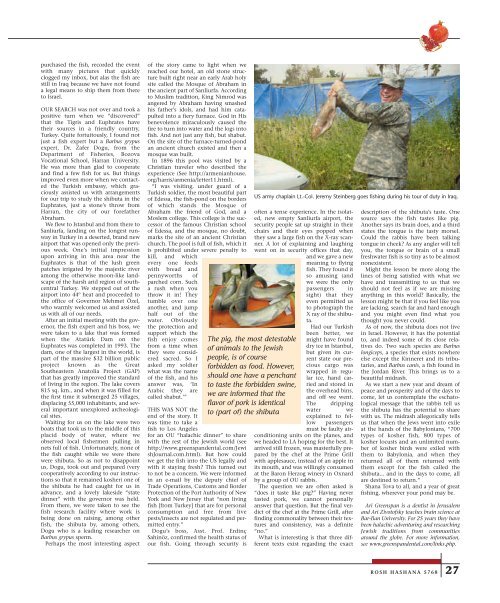
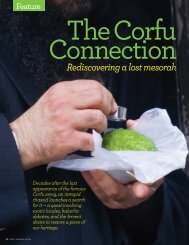
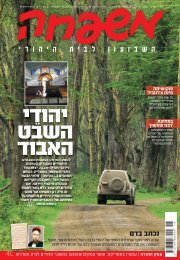
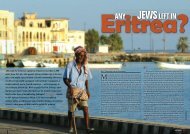
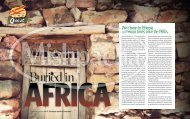

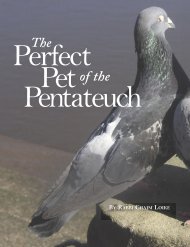
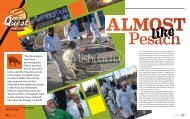

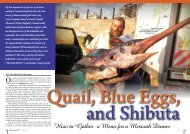
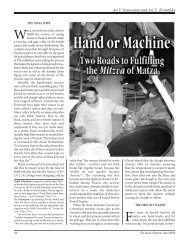
![llVtlwnl 1p1l 1biip 3 K11lnM o1it1 [1] - Halachic Adventures](https://img.yumpu.com/35271577/1/190x253/llvtlwnl-1p1l-1biip-3-k11lnm-o1it1-1-halachic-adventures.jpg?quality=85)

